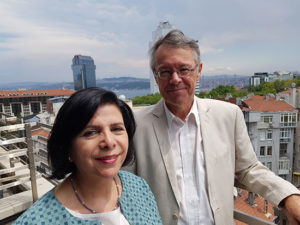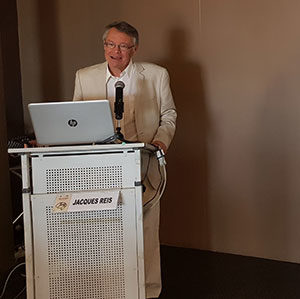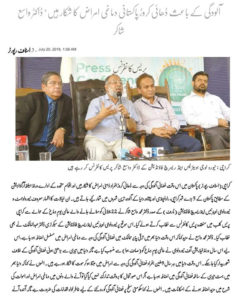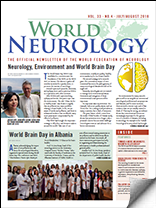By Wolfgang Grisold, Mohammad Wasay, and Jacques Reis
The World Brain Day (WBD) was established to commemorate the foundation of the WFN, at the WCN 2013, in Vienna. The idea is to gather all member societies for a yearly event, to promote the interest of neurology.

Jacques Reis, along with Serfnur Ozturk from the Turkish Neurologic Society, during World Brain Day 2018
Several topics such as stroke, dementia, and epilepsy were used in previous WBDs in cooperation with other societies.

After WBDs with topics involving epilepsy and stroke, this year’s topic was the environment. The title “Clean Air for a Healthy Brain” was chosen to signify that air pollution is a major problem relating to brain health. So far, we are aware of stroke and pollution, and there is substantial evidence that worldwide many more persons are compromised by the effects of pollution.
This WBD has brought the important message to all policy- and decision-makers around the world: Take care of our environment, notably air quality; healthy air is mandatory for our brain’s health!

The second message is for neurologists: The tremendous impact of environmental factors in the pathogenicity of many neurological diseases should not be neglected.
Presently, neurologists are not trained to manage such environmental issues. Prevention and mitigation of these environmental consequences will be important.
An important issue is prevention. For example, indoor air quality issues, such as “home fire” for cooking is still prevalent in many countries, due to lack of resources.

The great lesson, which comes from the stroke Global Burden of Disease study, shows that prevention is no longer only a personal concern but a societal challenge. Neurologists must act and advocate for a better environment.
Yet environment for many neurologists is still not as tangible as conventional neurological problems such as symptoms and diseases, and for some societies these seemed a remote topic and of less evidence than we are usually trained to think of. This may be wrong, as evidence shows that environmental factors are increasingly important for the generation of a number of diseases, including in neurology. An example is the Turkish Neurological Society, which has brought the debate to the societal level.

It has been the privilege of the WFN Applied Research Group on the environment to promote their topic, by yearly meetings, publications, and this year their effort was recognized as the topic of the WBD.
The World Brain Day team consisted of Jacques Reis, M. Wasay, Walter Struhal, and Wolfgang Grisold, with great help from Jade Levy and Laura Druce at the WFN offices in London, and we used press and promotional advice from Birgit Kofler.
This year the American Academy of Neurology (AAN) actively participated, which is a significant acknowledgement of the WBD activities, and also a sign of fruitful cooperation! We thank the AAN for their involvement.
In the past years, we have aimed to make virtual press conferences. Last year, we had a webinar to receive statements on the topic. This year, we collected a number of videos from specialists worldwide on the topic, and we hope that these interviews will be a source of ongoing information on environment and neurology.
The best immediate results of WBD are press and media echoes, as well as reports from our members on their celebration of WBD. All of this material will be collected, and will be subsequently displayed on the website to give an overall impression of this year’s WBD.
Please use our material, report on your WBD, and join us again for the next World Brain Day in 2019. The theme for 2019 World Brain Day is related to headache disorders.
RISE and the ENRG are pleased to invite you to the third meeting dedicated to the environmental impact on brain, which will be held in Strasbourg, Council of Europe Nov. 28-30, 2018. Visit asso-rise.com for more information. •
